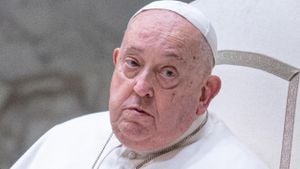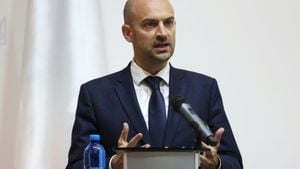Germany faces significant change as voters head to the polls for the 2025 Federal Snap Election, held on February 23. The election has been triggered by the collapse of Chancellor Olaf Scholz's three-way coalition last November, creating uncertainty about the nation’s political future. The campaign has been marked by pressing concerns about economic stagnation, migration, and security, leading to intense competition among parties.
With more than 59 million Germans eligible to vote, this election is expected to draw attention not just from within the country but also from across Europe and the United States. Observers are keeping a close eye on how results will shape Germany's role on the world stage and its domestic policies moving forward.
The center-right Christian Democratic Union (CDU), led by Friedrich Merz, has consistently led opinion polls, with support ranging between 28-32%. Merz has positioned himself as the frontrunner for the chancellorship, promising to bring stability following the tumultuous nature of the previous coalition. He has framed the CDU's campaign around addressing the economic woes plaguing Germany and has made strong statements about migration, emphasizing the need for stricter border controls.
"We need stability instead of chaos," Merz asserted, hinting at his plans to tackle the pressing issues head-on if elected.
Polling suggests the far-right Alternative for Germany (AfD) could secure around 20% of the vote, marking its strongest showing since World War II. Despite this surge, no other political parties have expressed willingness to enter coalition discussions with the AfD, effectively isolatting it from government influence. The party's hardline stance on immigration and its controversial rhetoric has ignited protests and fierce debate among the electorate.
Chancellor Olaf Scholz's Social Democratic Party (SPD) has seen its support dwindle, currently polling at about 14-16%, which would represent its worst performance since the postwar era. Scholz expressed concerns about Merz's approach to immigration, accusing him of "irresponsible gambling" by even engaging with the far-right party's policies.
"We cannot afford to break down the safeguards and norms of our democracy for the sake of votes," Scholz stated, emphasizing the need to maintain the integrity of the political system.
The Greens, under the leadership of outgoing Vice Chancellor Robert Habeck, are also competing for government influence but remain slightly behind Scholz's party. Their focus on environmental issues and sustainability could play well with voters concerned about climate change, but they face hurdles due to the front-running position of the CDU/CSU coalition.
Meanwhile, coalition talks loom large for the next potential government. Merz has hinted at possibilities for partnerships with either the SPD or the Greens, but the alignment presents challenges due to ideological differences. The risk of misalignment may lead to protracted negotiations post-election.
Polls indicate significant voter anxiety around multiple issues, with economic performance and immigration topping the list. A recent ARD-Deutschlandtrend poll noted these two concerns prominently, reflecting public sentiment after Germany has struggled with economic growth over recent years. Some economists are warning of possible recessionary impacts if these issues remain unaddressed.
"Germans are voting with anxiety over their future, with many desperately seeking leadership they can trust," commented political analyst Ingrid Meyer.
The elections are undoubtedly pivotal, not just for the political framework of Germany, but for its international relations, especially with the backdrop of the Russia-Ukraine conflict and NATO commitments. Scholz's government reached the NATO target of allocating 2% of GDP to defense, but the next government will face the challenge of maintaining this commitment as funding structures shift post-2027.
With voters mobilizing across the country, the polls open at 8 am and will close at 6 p.m. local time. This is more than just another election; it's framed as a watershed moment for Germany.
Voter turnout and engagement levels may significantly look different this year, as millions also opted for mail-in ballots before the election day. Yet reports suggest up to 20% of voters remain undecided heading toward the polls, illustrating the uncertainty fueling debate.
Following the fierce campaign marked by discussions around national safety and economic revitalization, all eyes are on Berlin as the results begin to emerge later this evening. The decisions made today will set the course for Germany for the next several years, raising the stakes for every voter.



